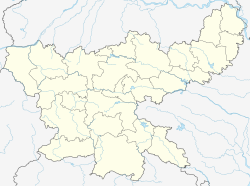
Angara block is an administrative CD block in the Ranchi Sadar subdivision of Ranchi district in the Indian state of Jharkhand.
Burmu block is a community development block in the Ranchi Sadar subdivision of Ranchi district in the Indian state of Jharkhand.
Bero block is an administrative division in the Ranchi Sadar subdivision of Ranchi district, Jharkhand state, India.

Kanke block is a community development block in the Ranchi Sadar subdivision of Ranchi district, Jharkhand, India.
Chanho block is a community development block in the Ranchi Sadar subdivision of Ranchi district in the Indian state of Jharkhand.

Bundu is a CD block that forms an administrative subdivision in Bundu subdivision of Ranchi district, Jharkhand, India.
Lapung is a community development block in the Ranchi Sadar subdivision of Ranchi district, in the Indian state of Jharkhand.
Mandar(mandar) is a community development block in the Ranchi Sadar subdivision of Ranchi district, in the Indian state of Jharkhand.

Ormanjhi block is one of the administrative CD blocks in the Ranchi Sadar subdivision of Ranchi district in the Indian state of Jharkhand.
Ratu is a community development block in the Ranchi Sadar subdivision of Ranchi district, in the Indian state of Jharkhand. Ratu fort, located in Ratu, is a fort of Nagvanshi royal family.

Silli is a CD block that forms an administrative subdistrict in the Ranchi Sadar subdivision of Ranchi district, in the Indian state of Jharkhand.
Tamar block is a CD block that forms an administrative division in the Bundu subdivision of Ranchi district, in the Indian state of Jharkhand.
Namkum is a community development block forming an administrative division in the Ranchi Sadar subdivision of Ranchi district in the state of Jharkhand.
Nagri is a CD block that forms an administrtive division in the Ranchi Sadar subdivision of Ranchi district, in the Indian state of Jharkhand.
Khelari is a community development block that forms an administrative division in the Ranchi Sadar subdivision of the Ranchi district, Jharkhand state, India.
Itki is a community development block that forms an administrative division in the Ranchi Sadar subdivision of the Ranchi district, Jharkhand state, India.
Rahe is a community development block that forms an administrative division in the Bundu subdivision of the Ranchi district, Jharkhand state, India.
Sonahatu is a village in the Sonahatu CD block in the Bundu subdivision of the Ranchi district in the Indian state of Jharkhand.
Silli is a village in the Silli CD block in the Ranchi Sadar subdivision of the Ranchi district in the Indian state of Jharkhand.
Rahe is a village in the Rahe CD block in the Bundu subdivision of the Ranchi district in the Indian state of Jharkhand.








